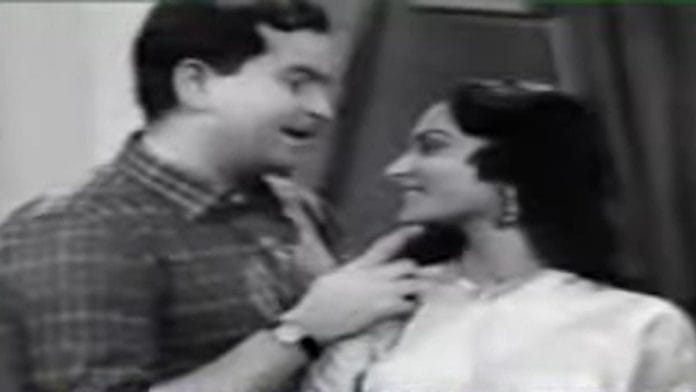Director RC Talwar’s Ek Dil Sau Afsane (1963) tackles the tug-of-war between society’s expectations and desperate love. It’s a commentary on the Indian family’s obsession with a son and how expectations fracture even intimate relationships.
It begins like a regular love story—Shekhar (Raj Kapoor) and Sunita (Waheeda Rehman) fall in love. But their union faces opposition from Shekhar’s grandmother, Nani (Lalita Pawar), who is obsessed with lineage and a male heir.
Talwar wastes no time in establishing Nani’s deep-rooted orthodox mindset. In the opening scene itself, she visits a potential bride’s home but promptly leaves after learning that neither the girl nor her mother has a brother.
For Nani, this lack of male offspring is a red flag, a curse passed down through generations. Her parting words to the girl’s mother perfectly capture her regressive worldview:
“I don’t want girls in my home. Your mother didn’t bear a son, neither did you—how can your daughter possibly give birth to one? I want a daughter-in-law who will bring a Krishna Kanhaiya into my courtyard.”
This moment sets the moral compass for the film’s central conflict: tradition versus personal happiness.
Nani’s later insistence on consulting a girl’s janam patri (astrological birth chart) to determine her capacity to bear a son further underlines how superstition and patriarchy are deeply intertwined.
The film makes it clear that such reliance on astrology isn’t a new phenomenon—it was institutionalised in households like Nani’s generations ago.
To protect their relationship and appease Nani, Shekhar and Sunita fabricate a lie—they claim a friend’s child as their own.
This deception becomes the turning point of the film, unspooling a series of events that challenge the limits of truth, loyalty, and the resilience of familial bonds.
On one hand, there’s Nani, so consumed by her desire for a great-grandson that she’s blinded to her grandson’s happiness. On the other hand, Shekhar and Sunita embrace a lie that can shake the faith of any family if uncovered.
Torn between family and love
Raj Kapoor’s portrayal of Shekhar captures the conflict between love and family that sons—and daughters—face even today. And Lalita Pawar’s Nani is the embodiment of every Indian.
When Shekhar returns home from college, Nani’s first remark is, “College mein khana nahi milta kya? Kitna patla ho gaya hai tu (Don’t you get food in college? You have become so skinny)”—a line that instantly resonates with generations of mothers and grandmothers. Some things, it seems, truly never change.
When Nani first meets Sunita and learns that she is an orphan, she responds with compassion. Offering Sunita a shoulder to lean on, she says, “Don’t ever call yourself an orphan again. I’m your mother now. Your bridal procession will leave from this home, and you’ll return to it too.”
But this tenderness quickly dissolves when she discovers that Sunita cannot bear children. Suddenly, the woman who claimed maternal affection turns cold and unyielding. She refuses to accept Sunita into the family and gives Shekhar an ultimatum: “If you go after her, your Nani will be dead to you.”
In this duality, Nani becomes a symbol of deep-rooted societal hypocrisy—capable of both immense affection and unforgiving judgement, which is dictated not by love, but by lineage.
Meanwhile, Waheeda Rehman complements Kapoor’s performance with grace and simplicity, embodying Sunita’s character, which is full of pride and compassion.
The climax unfolds when Nani discovers the truth about the child’s identity. The confrontation between her and Sunita is intense, steeped in pain, and vulnerability.
Yet, in a moment of clarity, Nani softens—she returns the child to his biological parents and embraces Shekhar and Sunita.
As the story nears its end, a turn of fate brings unexpected joy: Sunita conceives.
However, when the nurse announces the birth of a baby girl, Nani faints. The movie should have ended there. But soon after, it’s revealed that Sunita has given birth to twins—a boy and a girl.
Also read: Amitabh Bachchan learned a trick from Meena Kumari. It became a style statement in ‘Sharaabi’
‘Kuchh sher sunata hoon’
The music of Ek Dil Sau Afsane, composed by the legendary duo Shankar-Jaikishan, blends emotion, melody, and lyrical richness. Each song complements the film’s narrative arc, capturing the romantic tension, familial warmth, and emotional undercurrents with remarkable subtlety.
Mukesh’s voice, often considered the soul of Raj Kapoor’s on-screen persona, dominates much of the soundtrack.
The album of Ek Dil Sau Afsane includes tracks like Tum Hi Tum Ho Mere Jeevan Mein and Sunoji Suno Hamari Bhi Suno. But, Kuchh Sher Sunata Hoon Main hits differently because of its poetic flair.
The lyrics, penned by Hasrat Jaipuri and Shailendra, add depth and nuance, appreciating various aspects of a woman’s physical appearance.
The soundtrack of Ek Dil Sau Afsane not only elevates its cinematic mood but also stands on its own as a testament to the golden age of Hindi film music, where melody and meaning walked hand in hand.
The tragedy of Ek Dil Sau Afsane is that it remains relevant even today.
Views are personal.
(Edited by Aamaan Alam Khan)







Ananya is the light of our lives.